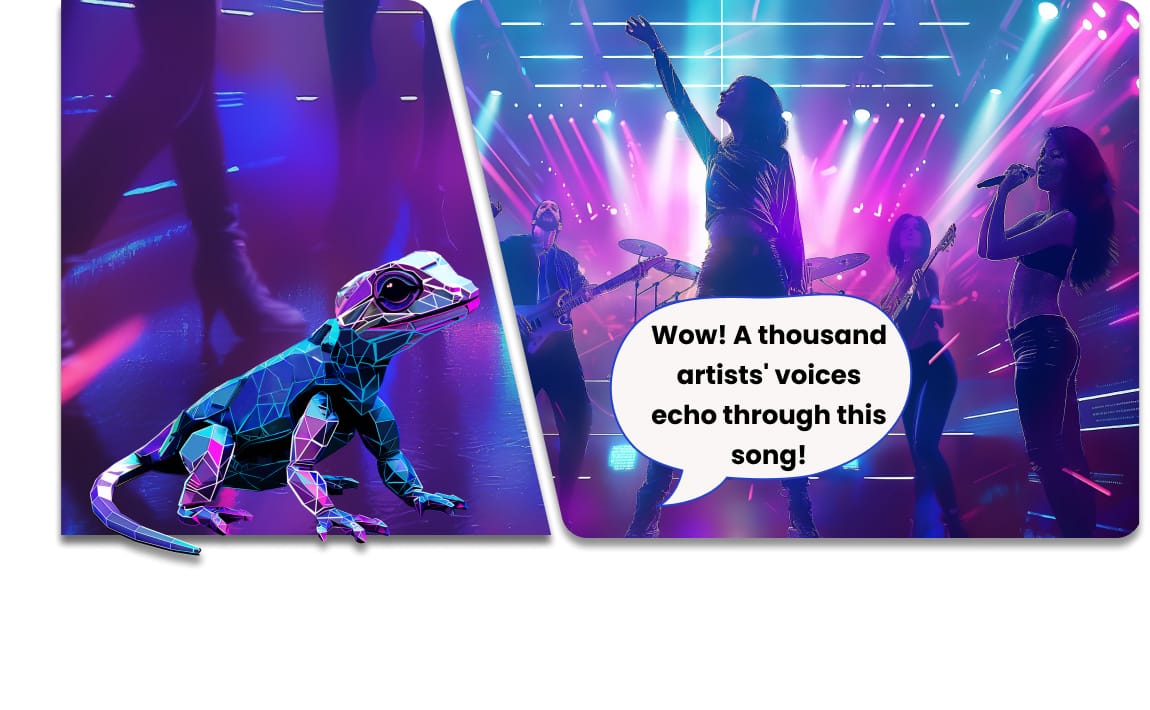- Cache Cookies AI
- Posts
- 🦾 AI and Creation: Copyright Challenges ✍🏻⚖️
🦾 AI and Creation: Copyright Challenges ✍🏻⚖️
Plus: The Rise of AI in Music Production 👨💻🎼


Welcome, humans.
Cache Cookies delivers your weekly dose of groundbreaking tech news, cool apps, brain-boosting knowledge, the latest on AI, and the lowdown on AI's wild side.
What You Need to Know About AI this week
AI and Creation: Copyright and Fairness ✍🏻⚖️
Record labels vs start-ups, the battle for music creation 📀
Music 2.0: AI composes the future of the industry 🪇
Read Time: 4 minutes
AI & CREATIVITY
The Rise of AI-Generated Content and Copyright Conflicts
The year 2023 saw a surge in tensions between the entertainment industry and AI companies surrounding the use of copyrighted content. In February, Hollywood actors, including writers, went on strike to protest the unauthorized use of their likenesses by AI technologies. Scarlett Johansson, in particular, expressed outrage after discovering her vocal double being used in the ChatGPT project.
Towards the end of 2023, The New York Times and The Times sued OpenAI and Microsoft for copyright infringement, accusing them of using millions of news articles without permission. Eight other newspapers followed suit in April 2024.
These lawsuits aim to establish clear precedents regarding the use of copyrighted content by AI and ensure fair compensation for content creators.
The Music Industry Unites Against AI
In April 2024, 200 renowned artists and songwriters, such as Billie Eilish and Nicki Minaj, signed an open letter denouncing the plundering of their music by AI companies for training their algorithms.
In late June 2024, music majors Sony, Universal, and Warner filed lawsuits against startups Suno and Udio, which specialize in AI-generated music. They accuse these companies of massively using copyrighted music to power their models, which can create entire songs from simple text prompts, perfectly imitating the style of existing artists, posing a threat to the industry and its musicians.
Suno, with its 12 million users and a partnership with Microsoft finalized in late 2023, has raised $125 million. Udio, funded by Andreessen Horowitz, has seen immediate success since launching its product last April. Disturbing similarities have been observed between songs generated by these platforms and popular hits. To give you an idea, here are two striking examples created with Suno (for more examples, visit this page).
Prompt: A rap song by an artist named Beminem
Suno can also generate voices resembling those of artists, here Ed Sheeran's, without specifically asking to create content in the style of that artist.
Prompt: Pop mainstream, distorted audio, aac
Models Trained Illegally on Copyrighted Content
According to Newton-Rex, CEO of the non-profit organization Fairly Trained, which specializes in ethical generative AI, using AI models trained on copyrighted works could constitute copyright infringement and harm artists. Examples include "Dancing Queen" by ABBA for Suno and "All I Want for Christmas is You" by Mariah Carey for Udio, songs generated by these platforms that are difficult to distinguish from the originals, illustrate this problem. The plaintiffs accuse AI companies of enriching themselves by simply copying existing songs.
In the face of lawsuits, Suno and Udio have highlighted their efforts to prevent their models from imitating copyrighted works. However, neither company has disclosed whether or not their training datasets include these copyrighted works.
A study conducted by Goldmedia, the first to examine the impact of generative AI on music and the creative sector, reveals significant fears among creators. 71% of the 15,073 respondents (members of SACEM and GEMA in France and Germany) fear that AI will make it impossible for music creators to make a living. Projections indicate that music creators' revenues could drop by 27% by 2028 if no compensation mechanism for human contributions is put in place. This could lead to significant losses in the music industry, with an estimated shortfall of $1.03 billion for music creators in France and Germany alone by 2028.
Protected Data and AI: Towards a Fairer and More Sustainable Model?
Legal battles over the use of copyrighted data for AI training are becoming increasingly common, likely marking the end of the era of free use of such data. Generative AI companies are now incentivized to opt for paid licensing agreements with publishers and copyright holders (e.g., Apple or YouTube). Artists and publishers are also taking steps to protect their works from unauthorized use by AI models (e.g., Data Masking).
It is time to rethink the rules of the game so that all stakeholders can benefit fairly from the success of these new technologies. Creators need transparency and control over the use of their work. But more importantly, they deserve fair and proportionate compensation for the revenue generated. Only a fair and sustainable approach will ensure the sustainability of the industry and preserve cultural richness and diversity.
AI & MUSIC
The Booming Market of AI-Generated Music
The market for AI-generated music is projected to reach a staggering $2.660 billion by 2033, with an expected compound annual growth rate (CAGR) of 28.6% during the forecast period.

Source: Market Us
This remarkable growth highlights the increasing significance of AI in the music industry, as the use of AI tools in music production has become commonplace, with an estimated 60% of musicians already incorporating AI into their creative processes.
A New Era for Music Creation, Distribution, and Consumption
AI in music offers a plethora of benefits for both music creators and enthusiasts alike. It democratizes music creation by providing accessible and user-friendly tools, empowering anyone to become a potential content creator. For established artists, AI can free up time for creativity and the development of their unique sound by automating tasks such as mixing, mastering, and producing backing tracks. Additionally, AI can suggest chord progressions and compositional ideas, assisting artists in pushing the boundaries of their creativity and seamlessly integrating AI-generated music into their creative process.
The founders of Suno believe that AI has the potential to become a new and accessible musical instrument, democratizing music creation in a similar way that smartphones and Instagram have revolutionized photography. AI also presents new opportunities for:
Decentralized Distribution: AI platforms enable artists to distribute their music directly, bypassing traditional record labels.
Personalized Recommendations: AI personalizes music suggestions on streaming platforms, offering a unique listening experience for each user.
Expansion into Emerging Markets: AI opens up new markets with composition and production tools tailored to local tastes.
AI is truly pushing the boundaries of musical creativity. As evidence, listen to these 12 songs created entirely or partially with AI technology. They showcase the wide range of musical styles AI can produce, from pop and electronic to experimental and ambient, demonstrating the versatility of AI in music creation.
In pursuit of ethical AI music generation, we explored alternatives that respect creators' rights and discovered Jen. This new music generation tool stands out from its competitors as it is trained on licensed material. While the results obtained by artists testing the tool are not yet fully convincing due to the limited amount of data used for its training, Jen represents an important step towards ethical AI usage in the music industry.
📜 WEEKLY QUOTE

JOB OPPORTUNITIES
That's it for now! Want more tasty AI insights? Visit our website and connect with us on Instagram, LinkedIn @Mila and @Zeynep. While you're there, consider spreading the word – share Cache Cookies with all your friends and colleagues who also like to stay sharp!







